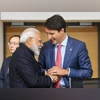Did Trudeau's advisor share classified intel on India with the US media?
Canadian news outlet claims that Prime Minister Justin Trudeau's top national security advisor briefed The Washington Post on sensitive intelligence regarding India
)
Prime Minister Narendra Modi with his Canadian counterpart Justin Trudeau at G-7 summit in Biarritz, France. (Photo: PTI)
Listen to This Article
Prime Minister Justin Trudeau’s national security advisor and a senior diplomat reportedly shared sensitive intelligence about India with The Washington Post just days before the Royal Canadian Mounted Police (RCMP) publicly linked Indian government agents to serious criminal activities in Canada, according to a report by Canadian news outlet The Globe and Mail.
Citing sources, the report stated that Trudeau’s top national security advisor, Nathalie Drouin, and Deputy Minister at Global Affairs, David Morrison, had briefed The Post on India’s interference operations in Canada. This briefing took place ahead of an RCMP press conference on October 14, where Commissioner Mike Duheme claimed to have evidence of Indian officials’ involvement in violent crimes but did not provide further details.
What did The Post article say?
The Post article was published on the same day as the RCMP press conference. It quoted unnamed Canadian officials linking India to the September 20 killing of Sikh leader Sukhdool Singh Gill in Winnipeg. The article also claimed that India’s Home Affairs Minister, Amit Shah, had authorised violent operations against Sikh separatists in Canada. However, the RCMP had not confirmed Gill’s killing was tied to India, nor had it disclosed the additional details reported by The Post.
Officials deny leak of classified information
Daniel Savoie, a spokesperson for the Privy Council, denied that any classified information had been leaked. “None of the information in the public domain that has been reported on is the result of classified intelligence,” Savoie told The Globe and Mail.
Former senior official at the Canadian Security Intelligence Service (CSIS), Dan Stanton, told the news outlet that information about Gill’s killing and its links to Indian officials would likely have been classified. He added that such intelligence would typically not be shared without proper authorisation.
Also Read
India-Canada relations
These developments have further strained relations between Canada and India. In September 2023, Prime Minister Trudeau accused India of being behind the murder of another Sikh leader, Hardeep Singh Nijjar, in Surrey, British Columbia. A few days after Trudeau’s allegations, Sukhdool Singh Gill was found dead at his home in Winnipeg. This was also deemed a homicide, though details of the case were not disclosed.
In response, diplomats were recalled by both nations. India briefly suspended visa operations in Canada.
During a high-level meeting in Singapore on October 12, 2024, Canadian officials reportedly confronted India’s national security advisor, Ajit Doval, with evidence of India’s involvement in violent acts in Canada. Doval, however, denied any links to the killings.
Canadian authorities have arrested six individuals in connection with Nijjar's death but have maintained that Indian government agents “threatened public safety in Canada.” In a press conference on October 14, Trudeau alleged that Indian agents had engaged in “clandestine information-gathering techniques, coercive behaviour targeting South Asian Canadians, and involvement in over a dozen threatening and violent acts, including murder.” He noted that while the evidence gathered by the RCMP could not be shared, it also could not be ignored.
Ottawa expelled six Indian diplomats, including High Commissioner Sanjay Kumar Verma, in response to the allegations. India retaliated by expelling six Canadian diplomats.
India responded firmly, stating, “The Government of India strongly rejects these preposterous imputations and attributes them to the political agenda of the Trudeau Government, which is centred around vote-bank politics.”
The Ministry of External Affairs added, “The Trudeau Government has consciously provided space to violent extremists and terrorists to harass, threaten, and intimidate Indian diplomats and community leaders in Canada.”
“The responsibility for the damage caused to India-Canada relations due to this cavalier behaviour lies solely with Prime Minister Trudeau.”
More From This Section
Don't miss the most important news and views of the day. Get them on our Telegram channel
First Published: Oct 23 2024 | 11:39 AM IST


